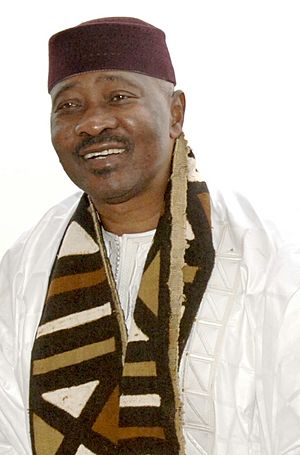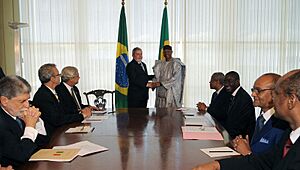Amadou Toumani Touré facts for kids
Quick facts for kids
Amadou Toumani Touré
|
|
|---|---|
 |
|
| 4th President of Mali | |
| In office 8 June 2002 – 22 March 2012 |
|
| Prime Minister | Ahmed Mohamed ag Hamani Ousmane Issoufi Maïga Modibo Sidibé Cissé Mariam Kaïdama Sidibé |
| Preceded by | Alpha Oumar Konaré |
| Succeeded by | Amadou Sanogo (Chairperson) |
| In office 26 March 1991 – 8 June 1992 |
|
| Prime Minister | Soumana Sacko |
| Preceded by | Moussa Traoré |
| Succeeded by | Alpha Oumar Konaré |
| Personal details | |
| Born | 4 November 1948 Mopti, French Sudan (now Mali) |
| Died | 9 November 2020 (aged 72) Istanbul, Turkey |
| Political party | Independent |
| Spouse | Lobbo Traore |
| Military service | |
| Branch/service | Army |
| Years of service | 1969–2001 |
| Rank | Army general |
Amadou Toumani Touré (born 4 November 1948 – died 9 November 2020) was an important Malian politician. He helped Mali become a democracy. From 1991 to 1992, he led a temporary government. During this time, he oversaw Mali's first elections where people could vote for different political parties. Later, he became the second democratically elected President of Mali from 2002 to 2012.
Touré was in charge of President Moussa Traoré's personal guards. In March 1991, a popular movement led to the overthrow of the government. Colonel Touré then arrested the President. He guided the country through a year-long change. This process created a new Constitution and allowed for multiparty elections. On 6 June 1992, he gave power to Mali's first democratically elected president, Alpha Oumar Konaré. Konaré later promoted Touré to the rank of General.
Ten years later, after leaving the army, Touré decided to enter politics. He ran as a civilian in the 2002 presidential election. He won with a lot of support from different groups. He was easily re-elected in 2007 for his second and final term. On 22 March 2012, soldiers who were unhappy with the government started a coup d'état. This forced Touré to go into hiding. As part of a deal to bring back normal government rule, Touré resigned on 8 April. Eleven days later, he left the country and went into exile.
Early Life
Amadou Toumani Touré was born on 4 November 1948, in Mopti, Mali. He went to primary school there. From 1966 to 1969, he studied at Badalabougou Standard Secondary School in Bamako. He planned to become a teacher. However, he later joined the army. He attended the Kati Inter-Military College.
Touré quickly moved up in the army ranks. He took many training courses in the Soviet Union and France. By 1984, he became the commander of the parachute commandos.
Political Career
In March 1991, there were many protests against the government. These protests turned into a popular movement against 23 years of military rule. The armed forces refused to fire on the Malian people. Touré, who was head of the presidential guard, arrested President Moussa Traoré. Colonel Touré, known as ATT, became the leader of a temporary committee. This committee worked to change the country's government to a democracy.
He led a national meeting from 29 July to 13 August 1991. This meeting created the Constitution of Mali. It also set the dates for the legislative and presidential elections in 1992. After the elections, Touré gave power to the new president, Alpha Oumar Konaré. Because he willingly left office, he earned the nickname "The Soldier of Democracy."
In June 2001, Touré briefly worked for the UN Secretary General Kofi Annan. He was a special envoy to the Central African Republic. This was after a failed attempt to overthrow the government there.
In September 2001, he retired from the military. He then entered politics as a candidate for the 2002 presidential election. In the first round of voting, he received the most votes. In the second round, he won with 64.35% of the votes. He defeated Soumaïla Cissé, another candidate. Touré was sworn in as president on 8 June 2002.
His presidency was different because he was not part of any political party. He included members from all of Mali's political parties in his government. After his 2002 election, he appointed Ahmed Mohamed ag Hamani as Prime Minister. Later, Ousmane Issoufi Maiga and then Modibo Sidibé served as Prime Minister.

On 27 March 2007, Touré announced he would run for a second term. This was for the April 2007 presidential election. He won the election with 71.20% of the votes. The main opposition candidate was Ibrahim Boubacar Keïta. Some opposition groups did not accept the results. However, observers from other countries said the election was fair. Touré was sworn in for his second term on 8 June 2007. Seven other African presidents attended the ceremony.
During his time as president, Touré improved Mali's roads and buildings. He also started the first national medical insurance system. This helped many people get healthcare.
The constitution of Mali says a president can only serve two terms. On 12 June 2011, Touré confirmed he would not run in the 2012 presidential election.
2012 Coup d'état
In early 2012, some parts of the Malian military were unhappy. They protested how Touré's government was handling a conflict in northern Mali. A serious incident happened in Aguel Hoc, where many Malian soldiers died. This led to unrest in the army. Soldiers and their families blamed President Touré for not providing enough supplies.
On 21 March, soldiers at a barracks near Bamako started a revolt. This revolt turned into a coup d'état. A group of soldiers took control of several places in Bamako. These included the presidential palace and state television. They formed a temporary government group. They announced they had overthrown Touré. They accused his government of not doing a good job. President Touré was not captured by the rebels.
For more than two weeks, no one knew where Touré was. The rebel group said he was "in good health." Some loyal soldiers said he was safe. He was guarded by pro-government forces outside Bamako.
On 8 April, Touré reappeared and announced his resignation. This was part of an agreement with the Economic Community of West African States (ECOWAS). The agreement aimed to bring back normal government rule to Mali. Touré said he resigned "out of the love I have for my country." On 19 April, Touré went to live in neighboring Senegal.
Amadou Toumani Touré returned to Mali on 24 December 2017, after five years away.
Other Work
In 1993, Touré started the Fondation pour l'enfance. This foundation helps with children's health. While he was president, his wife, First Lady Toure Lobbo Traore, managed the foundation.
Touré was also a member of the Earth Charter International Commission. This group works on global sustainability and peace.
Personal Life
Touré was married to Touré Lobbo Traoré. They had three daughters. He passed away in Istanbul, Turkey, on 9 November 2020. This was a week after his 72nd birthday.
Honours
 Mali: Grand Master & Grand Cross of the National Order of Mali
Mali: Grand Master & Grand Cross of the National Order of Mali Austria: Grand Star of the Decoration of Honour for Services to the Republic of Austria (2009)
Austria: Grand Star of the Decoration of Honour for Services to the Republic of Austria (2009) Luxembourg: Grand Cross of the Order of Adolphe of Nassau (11/2005)
Luxembourg: Grand Cross of the Order of Adolphe of Nassau (11/2005) Monaco: Grand Cross of the Order of Saint-Charles (13 February 2012)
Monaco: Grand Cross of the Order of Saint-Charles (13 February 2012) Senegal: Premier Prix pour l'Ethique, Fondation Amadou Kéba Mbaye (2010)
Senegal: Premier Prix pour l'Ethique, Fondation Amadou Kéba Mbaye (2010)
See also
 In Spanish: Amadou Toumani Touré para niños
In Spanish: Amadou Toumani Touré para niños
 | Audre Lorde |
 | John Berry Meachum |
 | Ferdinand Lee Barnett |


